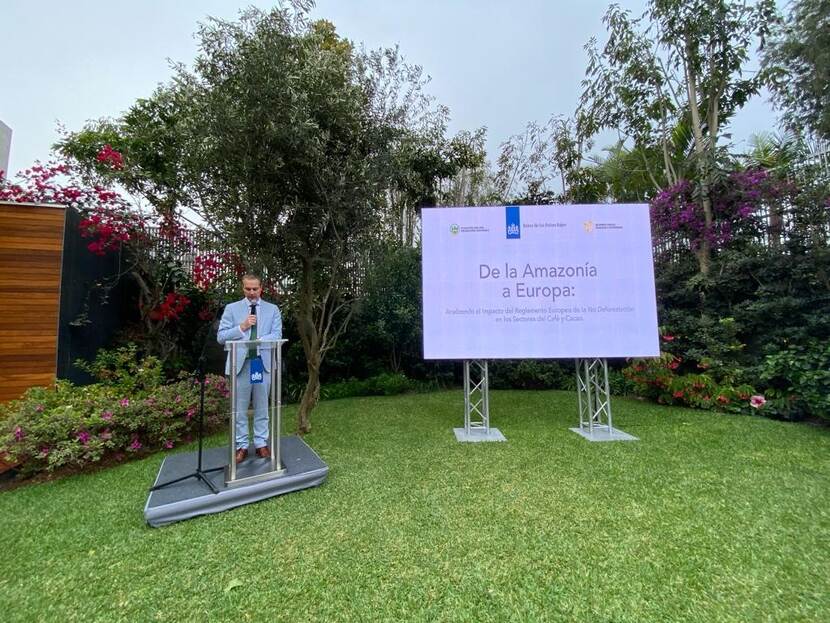Peru: building bridges for the implementation of the EU regulation on agro-commodities free of deforestation
The European Union's new law to ban imports and trade of products that promote deforestation in the European market (EUDR) gained a lot of attention worldwide since it was announced. Also, there are concerns, especially among small farmers of coffee, cocoa and palm oil in countries such as Colombia, Peru and Ecuador, about whether they would be able to comply.

The Netherlands has a strong commitment to cooperate with the Andean countries on subjects regarding sustainable agriculture. Also because of our important agrifood trade relations with these countries and our environmental foot print in them. This legislation has placed the Netherlands at the forefront of sustainable development efforts regarding agrifood systems in the region.
To further socialize the subject and involve all relevant stakeholders, the LAN Andes team, together with Solidaridad and Conservation International, organized the event "From the Amazon to Europe: Impact of the European Union's No Deforestation Regulation on Coffee and Cocoa" in Lima, Peru.
This successful session aimed to identify synergies to align the initiatives of the actors involved. It wanted to encourage and facilitate the effective implementation of cooperation strategies to reduce deforestation, and to promote a more sustainable agriculture which can comply with the European Union regulation.
The new ambassador to Peru, Mr. Alexander Koffman, hosted about 70 persons for this event at the Netherlands’ residence in Lima. Another 200+ people participated in the live broadcast from all over the region. The event was very well received, and the Netherlands look forward to continuing the fruitful dialogue with all stakeholders in order to support the implementation of the EUDR and sustainable agriculture in the Andes region.

During the event, different actors from both the public and private sectors had the opportunity to participate. Relevant Peruvian government institutions were taking part, including the Ministry of Agrarian Development and Irrigation (MIDAGRI), the Ministry of Environment (MINAM) and the Ministry of Foreign Trade and Tourism (MINCETUR).
The Peruvian Ministries are supporting growers to meet the requirements of the regulation, trying to ensure that the producer has access to land, for example, or through the development and improvement of their systems for monitoring deforestation.
From Solidaridad NL, Mr. Gerrit van der Bijl, senior advisor on European Union policy, provided a key note. This included an elaboration of the new regulation, next steps to be taken, challenges, and how the Andean countries can move forward in making the regulation work.
"Cooperation between countries is very important, and to see this regulation not only as a challenge but also as an opportunity for Peru. Peru can distinguish itself as a sustainable producer in the coffee and cocoa value chains" Mr. Van der Bijl said during his presentation.
Other speakers also had the opportunity to make presentations on this topic, and included the outcomes of the impact study conducted by Solidaridad on the EUDR on the coffee and cocoa chain in Peru. MIDAGRI’s director of Economic Studies presented the progress made so far in addressing the EUDR and its impact on the coffee and cocoa chain, while the EU Delegation in Peru addressed the timeframe and expectations for implementation.
For more information, please contact lim-lnv@minbuza.nl (Salvador Orrego), and the link to the event: Grabación de evento | De la Amazonía a Europa: impacto de la EURD en café y cacao - YouTube